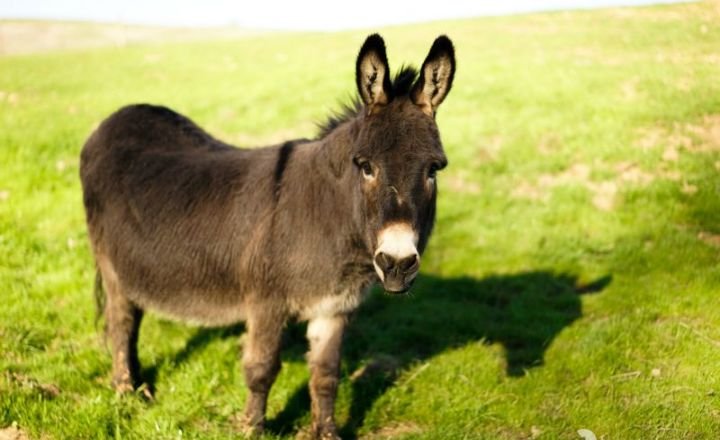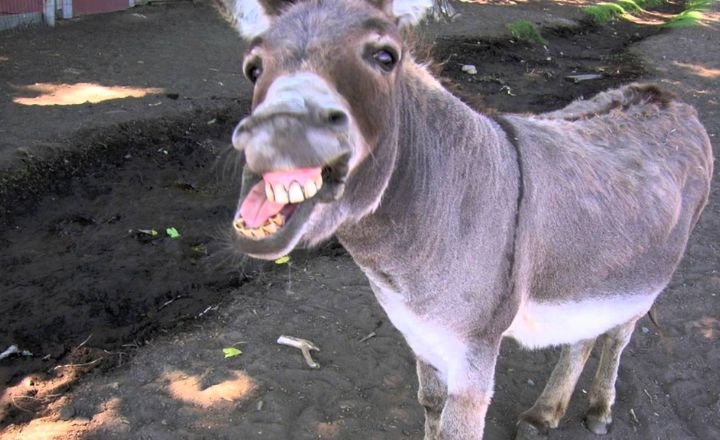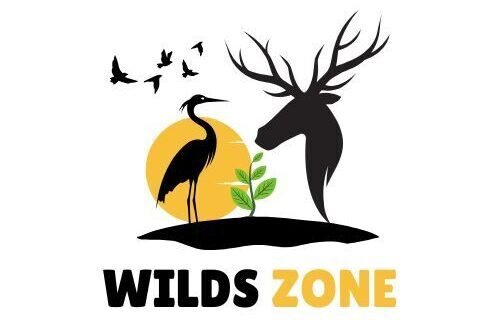Dog happiness ,monkey’s bright smile and some other animals are happy with their laughter. Similarly, a donkey is considered unique because of its sound and movements. Donkeys express their happiness or displeasure by making a variety of sounds and reacting to their environment.
Can Donkeys Laugh? Donkeys communicate with others through various sounds, body movements and donkey laughter is also like a human laughter. Donkeys have many sounds and many of them resemble laughter.
Donkey Bray or a Laugh
When donkeys bray, it seems like they are laughing, but in reality they are expressing different emotions and situations. Donkeys bray when they are happy, worried, or scared. This sound is not very similar to that of humans.
Humans laugh when they experience a pleasant or amusing reaction, but donkeys make this sound when they talk to other donkeys. It would be wrong to compare the sound of donkeys to human laughter because donkeys express changes or needs in their environment through their sounds.
Donkeys cry when they sense human or animal proximity. Donkeys make this sound even when they are sad or worried, but sometimes the sound of donkeys can also be likened to laughter.
The Three Main Sounds of a Donkey
The braying of donkeys is considered the most common sound, which expresses their lives and circumstances. When donkeys make loud or prolonged sounds, they express the presence of others or a demand for something.

This sound plays an important role in the donkeys’ connection to their environment and social life. Donkey is relaxed and tired, it makes a sigh or breathing sound. When a donkey is weak, tired, or bored, it makes this sound with a deep breath.
When a donkey senses the presence of a new situation, an unfamiliar animal, or a threat, it makes a braying sound, a sharp, sudden, and short sound, to alert other donkeys or animals. They can better understand the language of donkeys and their lives, but also describe changes in the environment.
Donkeys Laugh at Funny Things
Donkeys make sounds that sound like human laughter, but are actually loud noises that they mostly make to communicate with their environment or to make their presence known. Donkeys do not express joy or laughter.
Donkeys express various emotions through their vocalizations. This may be a natural reaction to a change in their environment or to their needs. Donkeys do not make noises when they are funny or have fun, but rather in response to internal pressures and the environment, which are the basis for their need-based reactions.
This sound of donkeys may be mostly a practical and instinctive reaction to changes in their environment, which they make to communicate with animals or humans. Do donkeys laugh might seem whimsical, yet it opens up a fascinating exploration into animal behavior and communication.
Do Donkeys Sound Like Laughter?
Just as horses and other animals have the ability to make sounds, a donkey’s laughter or laughter-like sounds may be related to its physical and mental systems.

Donkey laughing comes from the respiratory tract and other parts of the body, which are not similar to human laughter, and the resonance and intensity of the sound are so high that it seems like the donkey is laughing.
The purpose of a donkey braying may be to communicate with humans, to signal their presence, or to warn them of something. Donkeys make loud noises to avoid danger and vary the intensity and nature of the noise according to the donkey’s environment.
The Biological Aspect of Donkey Sounds
When donkeys produce sounds in different ways using the structure of their throat and respiratory tract, it is a result of their physical characteristics and natural adaptations. Making sounds helps donkeys better adapt to their environment and increase their communication skills.
Donkeys produce loud and high-pitched sounds through specific muscles and air circulation in their bodies, which are essential for the survival of donkeys. They can express their condition or danger. Can donkeys laugh? While they may not chuckle in the human sense, these remarkable animals exhibit a range of vocalizations that hint at a deeper emotional world.
How Long do Donkeys Live?
The lifespan of donkeys depends on various factors, including their genetic characteristics, diet, and resistance to diseases. If donkeys live in a safe environment, they can live up to 40 years. Exercise and daily activity are a quality of life for donkeys that helps them live longer.

If donkeys live to be 40 to 30 years old, it is due to their body weight and the skill of the people who maintain the cleanliness of the living environment. Similarly, if donkeys are not properly cared for, their lifespan is greatly shortened. Do donkeys actually laugh? these sturdy animals do have their own unique vocalizations that can mimic the spirit of joy
Understanding Donkey Communication
When donkeys bray, they are expressing their feelings and needs or making this sound to communicate with other donkeys. To understand donkey communication, it is important to understand their vocalizations and movements.
You can tell a donkey’s mood by its tail and ears. Donkeys sometimes express their feelings through various signs, such as stamping their feet on the ground when angry and displaying various signs to communicate and express their physical contact with other donkeys.
Miniature Donkeys
Donkeys are often kept as pets for children or as farm animals because of their small size or gentle nature when interacting with humans. They are very small in stature and can reach a height of 36 inches or less.
These donkeys are small in size but are still used in the fields and for carrying loads. They are kept with other animals and donkeys so that they can be happy and it is very important to get them fully vaccinated or checked up.
Conclusion
Can Donkeys Laugh or make funny sounds to communicate and get attention. Donkeys don’t naturally laugh like humans, but when they make these sounds, it sounds like they are laughing. Donkeys make a variety of sounds to express their emotions, such as sometimes making soft brays or breathing sounds.
Laughter does not exist in the donkey’s communication system; instead, donkeys communicate with others through their vocalizations, body movements, and signals of a specific purpose or feeling.
FAQs
Can donkeys actually laugh?
While donkeys do not laugh in the same way humans do, they can produce vocalizations that resemble laughter when they are happy or playful.
What sounds do donkeys make when they’re happy?
Donkeys often bray, which can sound like a humorous hee-haw. This noise indicates excitement or contentment.
Do donkeys express emotions like humans?
Yes, donkeys exhibit a range of emotions, including joy, sadness, and affection, similar to other animals.
